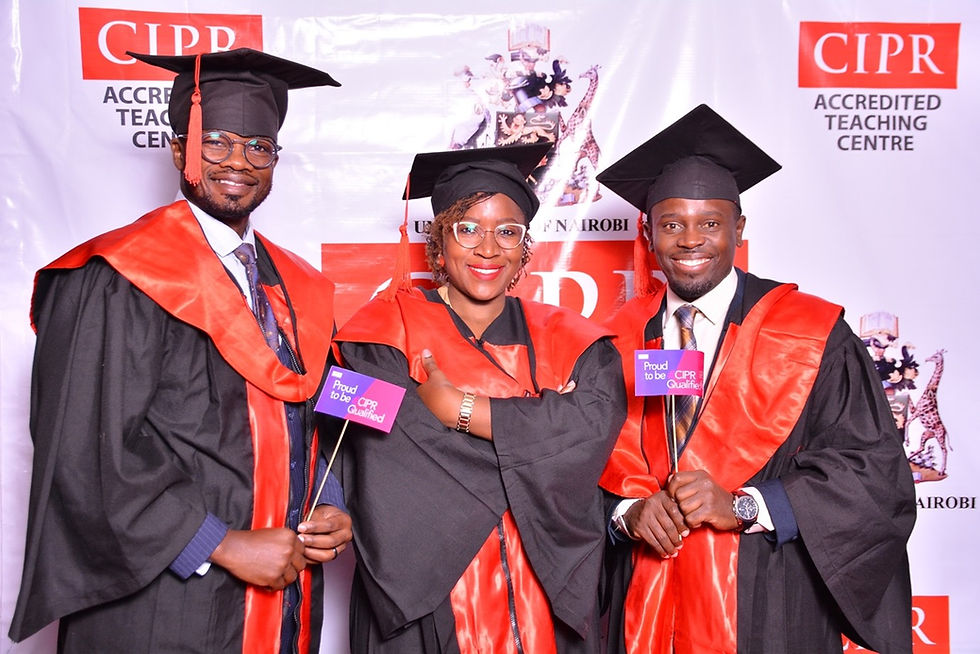Creating a unique peer-learning and exchange experience in Eastern Africa
- CIPR International
- Jul 6, 2022
- 3 min read
By Neema G. Mutemi, MCIPR , a Strategic thinker, Communicator, International Development practitioner and Youth Development Expert, based in Kenya.

For many PR professionals, the pandemic brought an opportunity for retrospection and bought us time to reflect on our career choices to assess our satisfaction, level of contentment or lack thereof, and to some, an opportunity to do things differently.
The peer-to-peer connection provided by learning with the CIPR has the potential to nudge one from the proverbial “comfort zone” or validate another struggling with the notorious “imposter syndrome” and liberate yet another from self-flagellation or feeling defeated from past failures and mistakes; making us more empathetic and compassionate to others.
Just as the COVID-19 lockdown was being announced, the University of Nairobi commenced the flagship online CIPR qualifications programme where I now teach students drawn from Kenya, Uganda, South Sudan, Somalia and Rwanda. The online classes, which began as an adaptation measure, have, in my opinion, become an irreplaceable platform for regional networking and have birthed a new CIPR International experience.
Let me paint a clearer picture for you. Between 2020 and 2022, the Eastern African region has seen a civil war erupt in Ethiopia in November 2020, Tanzanian and Ugandan general elections taking place in 2020 and 2021 respectively and Kenyan elections are set to take place in August 2022. During Tanzania and Ugandan elections, access to social media and the internet was disrupted, affecting business operations.
The Black Lives Matter movement which started at the height of the pandemic in the U.S.A has led to product boycotts and rebranding strategies in the East African market. Class discussions provided invaluable to help us get to grips with the situations happening in the different geographic contexts, helping us to draw fresh perspectives from each other’s first-hand accounts, to challenge stereotypes and to have a dynamic view of issues and events. The collective experience of the COVID-19 pandemic also provided an opportunity for robust analysis and peer learning of the role of PR in crisis communication, combating mis-information, understanding government communication and celebrating innovative solutions across sectors that deeply enriched class discussions.
“This was such a powerful cohort. I remember listening to issues management case studies from Litein Hospital in Kenya and comprehending agricultural researchers plight in Uganda. I hope they keep the networks and conversations going,” says Paul Barasa, CIPR Tutor, University of Nairobi.
Empathy and validation from peers are powerful gifts especially where adult learning and behaviour change are involved. Many times, the students needed to lean on each other as they were juggling homeschooling, dealing with various work crises and the general responsibilities of adulting during a long pandemic. Learning to navigate judgement of self and others, and overcoming prejudices and political bias enabled them to engage in intellection debates and critical analysis. Being able to put yourself in another’s shoes, gives you perspective and a better understanding of your own privilege, strengths, weaknesses and resources that you otherwise take for granted.
"CIPR is like a gateway to a truly rewarding African Safari with experienced guides offering authentic unbeaten experiences.” Eric Edrine Ntalumbwa, PR Officer, Uganda Wildlife Conservation Education Centre
As they graduated last Saturday, I was both honoured and proud to see how much the connection they had developed with each other and with their tutors, has helped them to grow in both competence and confidence, and to develop compassion for themselves and others in the rapidly growing PR industry in the region. I, too, am thrilled to be part of this exciting CIPR International journey.
"The CIPR programme has helped me understand and appreciate the changing world of PR and challenged me to unlearn and explore new approaches and strategies in public relations and stakeholder engagement. Importantly, my unique experience through the course has been interacting and learning from industry experts and peers." Bukenya Paul, PR Officer, The Electoral Commission of Uganda.
"Doing my Diploma with CIPR has opened my eyes to new opportunities that I can explore in my career. Having been exposed to trends and best practice in PR I am now equipped to venture into contemporary niche areas of practice and add value to my work. I have taken up new assignments that make my work more exciting and rewarding." Millicent Muthoni, Communications Manager for Writing at Equity Bank (Kenya).
"CIPR was intense and it was eye-opening with a global lens to PR issues. The classes were very engaging with great topics, rich conversations, and experienced tutors who gave their best. There was plenty of knowledge sharing, learning, and networking amongst my classmates. The expertise I have gained in strategic communications has propelled my career forward and enabled me influence strategy at the decision-making level." Juliet Kwamboka Ratemo, Director of Comms, The Pharo Foundation.









































Comments